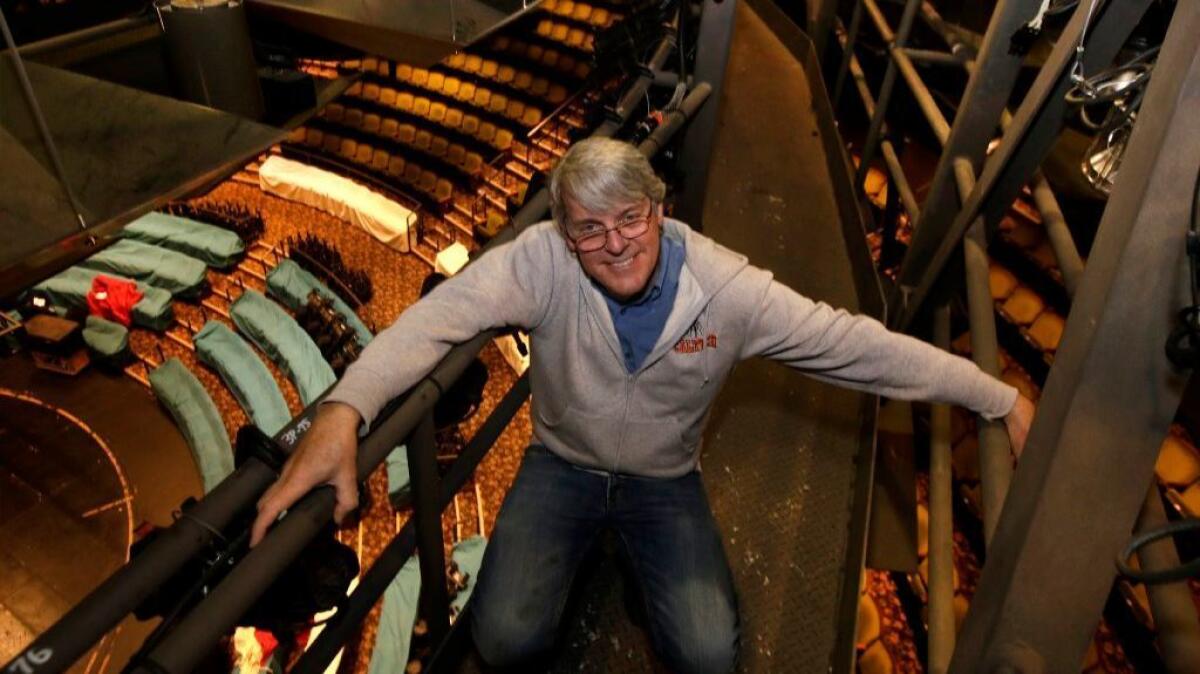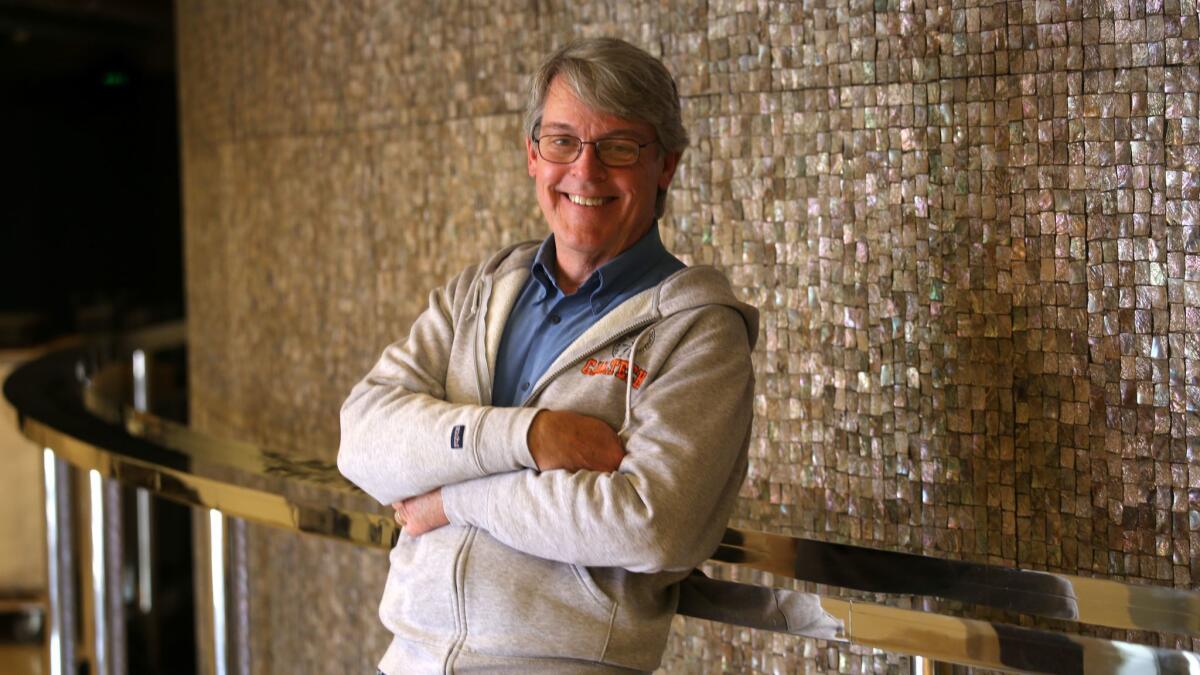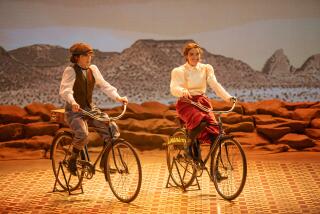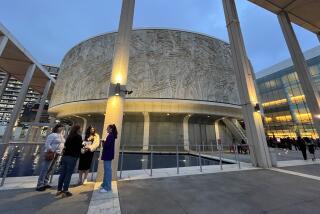Jonathan Barlow Lee knows all the Mark Taper Forum’s secrets — and he’s telling

There’s a train car in Jonathan Barlow Lee’s future. It is roughly 30 feet long, made of gleaming black steel and weighs four tons. The image of the locomotive, suspended from chains and swinging from the rafters above the Mark Taper Forum stage, both excites him and haunts him. The train car will be the primary set piece in the second act of “Archduke,” the Rajiv Joseph play beginning previews later this month — and it is Lee’s job to steer the custom-built vehicle through a narrow, curved load-in area and onto the stage.
It’s a deceptively complicated maneuver — the train car will have to be taken apart to fit through the Taper’s load-in doorway — but for Lee, the long-running production manager here, the task is just another day at the office.
“It’s just what I do,” Lee says. “This has always been a building that has been stretched beyond any of its initial capabilities. We’ve tried to create a space here that is limited only by the imaginations of the people that are doing their art.”
Lee has worked at the Taper for almost 40 years, starting as a freelance stage manager in 1977 before joining the staff full time as production manager almost 30 years ago. He’s responsible for a mind-boggling thicket of backstage intricacies prior to each production: overseeing the heads of the carpentry, props, audiovisual and lighting departments; steering set load-ins and breakdowns; building show budgets; even managing the minutiae of, say, a light bulb popping. He’s a forward-thinking troubleshooter of the highest order, a fixer-on-the-fly when any number of scenarios inevitably go wrong in live theater.
Settling into his favorite spot in the auditorium — a slender ledge behind the last row of seats, house left — Lee alludes to a trove of Taper anecdotes. And today, he is spilling. In blue jeans and a roomy Caltech sweatshirt (his son’s alma mater) and with thick, silvery hair, an easy smile and feet propped on the chair armrest in front of him, Lee appears more an amiable suburban dad rather than the central cog in a quick-spinning wheel. But Lee’s institutional knowledge of, and affection for, the theater — both the art of performance and the physical Mark Taper Forum — is clearly apparent.
“I love the idea that tomorrow is gonna be the best show ever,” he says. “Because every night, every experience, is unique. There’s an alchemy that goes on between performers and the audience. It’s a kind of magic.”
One of the Taper’s first production snags, he recalls, unfolded shortly after the theater was built in 1967. The building featured a conveyor belt backstage for transferring scenery — considered an experimental technology at the time.
“It was a wooden conveyor belt — kind of new at the time, and they thought would be wonderful,” says Lee, who saw it in operation during Paul Sills’ 1970 “Story Theatre,” a production of fairy tales. “The idea was that you would push a button and the scenery would magically drift out on stage. The problem was, it was incredibly loud. It sounded like a freight train crashing into another freight train. So it never really worked.”
Lee was a stage manager on playwright Luis Valdez’s groundbreaking “Zoot Suit” production debuting at the Taper in 1978 — the first Latino play to go mainstream, moving on to Broadway in 1979. The show’s massive success here, he says, became a profound moment for the city and the theater community.
“We didn’t realize what we had. But it blew the roof off the place. When Edward James Olmos came out and just took the stage, it was like he was taking this neighborhood back,” Lee says, adding that it was a phenomenal experience to see a Latino actor symbolically reclaim what once had been a Latino area.
Lee was a self-described “theater kid” at UCLA who came from a theatrical family. His father, Robert E. Lee, co-wrote the 1955 play “Inherit the Wind,” and his mother, Janet Waldo, was the voice of the cartoon Judy Jetson. His first encounter with the Taper was during a junior high school tour of the Music Center Annex, across the street from the Taper, where rehearsals are held.
“I remember peering into one of the rehearsal rooms where the stage manager sat and thinking: ‘I’d like to do that,’” Lee says.
He took a crack at directing during the 1981 international tour of “Children of a Lesser God,” which had debuted at the Taper in 1979; and he directed a Deaf West revival of the play in 2009. “But I prefer the hands-on aspects of production management and stage management,” he says.
Recounting epic challenges and production fails, Lee’s face brightens with each memory, his blue eyes widening and hands gesturing animatedly. Like Ariel Dorfman’s 1991 play, “Widows,” for which foam mannequins built to resemble dead bodies washing up on shore at first floated too much, then sank when water-logged. (The approach eventually was abandoned.) Or the Mary Zimmerman-directed production of “Metamorphoses,” in 2000, which he describes as a leaky “swimming pool play.”
“Whenever we have water on the stage, it’s always a big deal,” Lee says. “For ‘Metamorphoses,’ we loaded everything in, we had the first evening of tech and discovered our swimming pool leaked. We had to pump the water out and refill it in a day. Also in that show, the actors were cold. They were wet. So we had to create warming huts for them. All the backstage support was incredibly complex for that.”
In a climactic moment during Moisés Kaufman’s 2015 revival of “Bent,” when a Nazi prison guard is supposed to shoot concentration camp prisoner Horst (Charlie Hofheimer), a gun jammed and an SS officer (Hugo Armstrong) had to improvise by strangling the character instead.
Even Mark Taper Forum trivia is fresh in Lee’s mind: 736 seats, 16 stalls in the ladies room, wall panels made of zebra wood, ceiling panels made of adjustable fiberglass. His affection for the building is so great that the day a $30-million renovation began in 2007, he got stressed out watching the infrastructure crumble and his back went out. He was in bed for two weeks, unable to move.
“It’s a building that is central to me, it’s part of my identity,” he says. “I felt psychically linked to the building, so watching them bust it up and cut it apart, it was very stressful for me.”
When, finally, Lee returned two weeks later, he had come to terms with the building’s dismantling and could only see possibilities. “The worst of it was done. All I could see was improvements,” he says.
The new Taper, largely due to his influence, he says, now boasts a wider load-in door and a roomier wing area. Not to mention — at Lee’s insistence — a drain under the stage.
The production challenges that undoubtedly lay ahead only energize Lee.
“I’m excited about ‘Archduke,’ about what we’re gonna have to do with the train. We have another show coming up — ‘Head of Passes’ — which involves a reservoir of water that the set has to sink into. Those kinds of challenges are the ones that I love.”
He slides back against his ledge, surveying the auditorium.
“That train,” he says, eyes gleaming. “I’m nervous about it, I’m excited, I just wanna see it work.”

Follow me on Twitter: @debvankin
ALSO
CTG at 50: Artistic director Michael Ritchie plots the second act (Hint: Think Hollywood)
The duel is on: CTG to launch ‘Spamilton,’ the hit ‘Hamilton’ parody
More to Read
The biggest entertainment stories
Get our big stories about Hollywood, film, television, music, arts, culture and more right in your inbox as soon as they publish.
You may occasionally receive promotional content from the Los Angeles Times.







